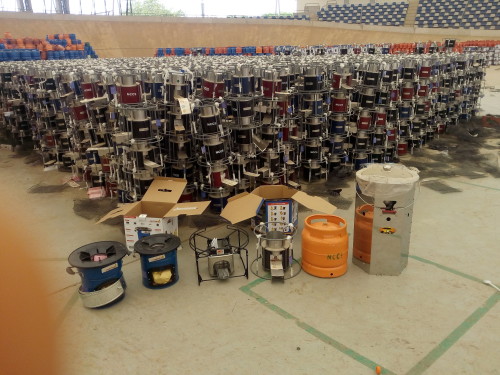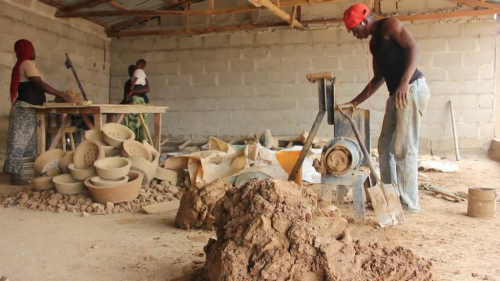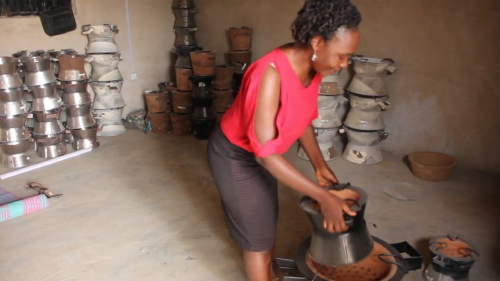A group of civil society organisations with a bias for sustainable cooking solutions in a joint statement issued in Abuja on Tuesday, July 7, 2015 expressed reservations over the controversial N9.2 billion clean cookstoves project, which they say is giving the nation a bad name and hurting the businesses of local producers

The Nigerian Alliance for Clean Cookstoves is a public-private partnership to save lives, our forests and empower women by providing safe and sustainable cooking solutions to households and institutions in Nigeria. The Alliance seeks to achieve these goals by influencing public policies, strengthen the supply chain for cooking energy solutions and enhance the demand for safe and sustainable cooking energy. Partners of the Alliance include key federal government agencies, companies, donors, NGOs and the media.
The Nigerian Alliance is deeply concerned over the implementation of the Federal Government of Nigeria’s N9.2 billion clean cookstoves project. Over 95,000 Nigerians, mostly women and children die annually from smoke from the kitchen. This is Nigeria’s third highest killer after Malaria and HIV/AIDS. In addition, Nigeria loses 3% of its forests annually partly as result of the cutting of trees for firewood. If the N9.2 billion set aside for this project was properly used, the lives of thousands of Nigerians and our forests would be saved and our women and youths will be empowered with new job opportunities.

Partners of the Alliance are worried that controversies created by alleged lack of transparency and accountability in the award and implementation of the N9.2 billion project will damage the reputation of this emerging clean energy industry. Further, we are also concerned that the initiative focuses on the importation of stoves that can easily be produced by Nigerians. By investing this money in Nigeria, we could have created thousands of new jobs and supported new and existing small businesses.
The Alliance is further concerned about the impacts of the free distribution of stoves on the local industry. Many of our partners have seen sales of their clean cooking energy products plunge as a result of the anticipation of free stoves from the government. Ms Happy Amos of Roshan Global Renewable Energy Company is one example. Ms Amos was awarded the Federal Government’s YouWin grant two years ago. The young woman invested her grant in a small wood and charcoal stove factory in Dikko village, outside Suleja in Niger State. She sells her stoves in Niger, Kaduna and Plateau States and now employs about ten other young people. According to Ms Amos, “since the announcement of the government’s free stove project, sales have declined. Potential customers said they would rather wait for the government’s free stoves than buy my stoves. I have lost significant business as a result of this project. The government cannot give in one hand and take from the other,” she told partners of the Alliance.

Given the current controversy surrounding this contract, the Nigerian Alliance strongly recommends that the Federal Government invest the remaining N7.3 billion of this contract into domestic clean cooking energy production and distribution. These funds should go to soft loans, working capital and machineries, grants for training and capacity building as well as public awareness. The aim will be to expand the local distribution of cooking gas (LPG) and biofuels as well as the local production and distribution of efficient wood and charcoal stoves.
Despite a challenging business environment, Nigerian companies are expanding the production of clean cooking fuels such as LPG, ethanol and efficient wood and charcoal stoves. Over the past year, LPG consumption has experienced double digit growth, however, less than 5% of all our households use this locally produced cooking gas. Ethanol companies have set ambitious expansion plans but continue to struggle with access to finance. Several entrepreneurs such as Ms Amos are struggling to finance expansion plans for their ceramic, mud and metal efficient wood and charcoal stoves. Re-directing part of the N9.2 billion funding to local production and distribution will empower these companies to help save lives and our environment as well as create jobs for women and youths.
By investing the remaining N7.3 billion of this contract in local production, the Federal Government will create over 100,000 new direct and indirect jobs, and support at least five thousand new small businesses. At least half of this amount should be dedicated to women and youth entrepreneurship programmes for production of clean cookstoves using locally available raw materials.
The Nigerian Alliance proposes that the already procured stoves be set aside for high value humanitarian purposes such as support for Internally Displaced Persons (IDPs). The National Emergency Management Agency (NEMA) is already working with local and international partners to set up the Safe Access to Fuels and Energy for IDPs in the Northeast. These stoves could be part of this initiative.
Finally, partners of the Nigerian Alliance for Clean Cookstoves seek dialogue with the Federal Government over the re-design of this project to ensure it contributes to saving lives, forests and empower our women and youths.
The following partners of the Nigerian Alliance have endorsed this statement:
- Alpha O. Center
- Bio Solutions Ltd
- Christian Aid
- Clean Energy and Safe Environment Initiative
- Community Research and Development Centre (CREDC)
- Daily Trust Newspapers
- Developmental Association for Renewable Energy (D.A.R.E.)
- Double-Link Corporate Ventures
- Energy Commission of Nigeria
- Federal Ministry of Women Affairs
- Follow the Money (CODE)
- Gas on Wheels
- Greenado Limited
- Heinrich Boll Foundation
- International Centre for Energy, Environment and Development (ICEED)
- Musa Raymond Nigeria Company Limited
- Nenu Stoves
- Ozalla Hexagonal Technology
- Quintas Renewable Energy Solutions
- Roshan Global Services Limited
- Rural Builders Organisation
- Samaru College of Agriculture, Ahmadu Bello University, Zaria
- SMEFUNDS GEBIOFUELS
- SOSAI Renewable Energy Company
- Standards Organisation of Nigeria (SON)
- Techno Oil Limited
- Tropical Research & Conservation. Centre
- Women Environment Programme
- Women Initiative for Sustainable Environment
- Zagos Services Limited
